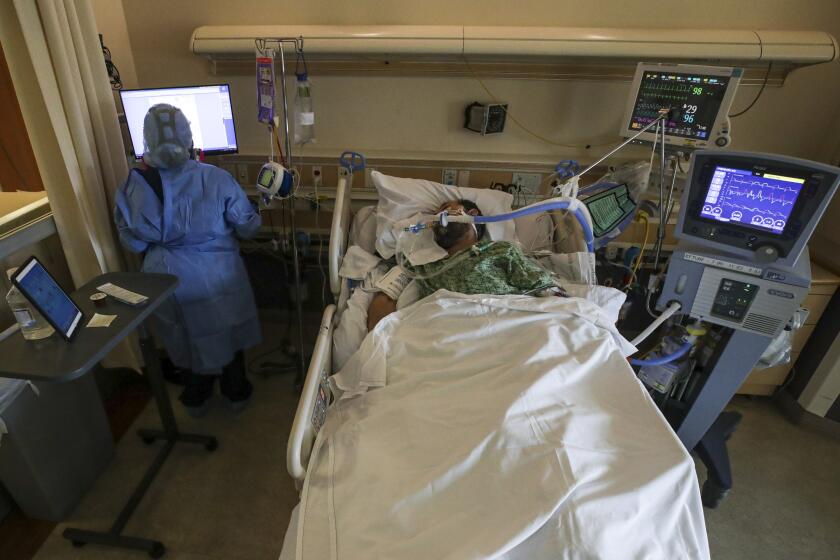Keeping lost pounds off
The Internet may be your Best Friend Forever, but when it comes to keeping weight off, you’re better off communing with a real person, according to a multi-center study conducted by investigators at Duke University Medical Center and three other research institutions.
In a 30-month investigation, the researchers compared the effectiveness of personal contact with a trained weight-loss counselor to Internet support in helping volunteers stave off weight gain after an initial weight loss.
Assessing the group every six months, the investigators found that although both personal and Internet support provided modest benefits in sustaining weight loss at 24 months, at 30 months only the personal-contact group fared better than the control group, which received no support beyond printed instructions.
The study, which appeared in last week’s Journal of the American Medical Assn., was an attempt to shed a little light on the issue of how to keep off those hard-lost pounds.
“We know a fair amount about how to help people lose weight, but we know almost nothing about how to help people maintain weight loss,” says the study’s lead author, Dr. Laura Svetkey, a professor of medicine and director of the Duke Hypertension Center at Duke University Medical Center in Durham, N.C. “We wanted to look at strategies that could be disseminated very broadly, that would be efficient and affordable.”
The research took place at Duke, Johns Hopkins in Baltimore, Pennington Biomedical Research Center in Baton Rouge, La., and Kaiser Permanente Center for Health Research in Portland, Ore.
In the study, investigators divided 1,032 volunteers, who had lost an average of 18.7 pounds in an earlier phase of the research, into three groups.
One, the personal-contact group, received 5- to 10-minute phone calls with a weight-loss interventionist each month and an hourlong, in-person session every four months. The counselor reviewed the volunteer’s progress, discussed food and exercise goals and addressed barriers to maintaining the weight loss.
The Internet support group received unlimited access to a website designed by the researchers to support weight-loss maintenance. The site was interactive and focused on setting goals, developing plans, tracking personal data and solving motivation problems. Participants were encouraged to log on weekly, and those who missed a scheduled contact were sent e-mail reminders.
The Internet approach is particularly interesting to researchers because of its affordability and accessibility, Svetkey says. It is already widely used by people trying to lose weight. For example, the Weight Watchers website, which launched in 2001, had more than 17,000 unique visitors in January, as well as more than 2 million posts on its message board.
The third set of volunteers, a control group, received printed lifestyle recommendations at the start of the study, including instructions on diet and physical activity.
On average, after 30 months, the participants in the personal-contact group regained 8.8 pounds of the 18.7 they had lost earlier; the Internet support group and control group regained 11.4 and 12.1 pounds respectively.
Svetkey acknowledges that the maintenance results were modest. But, she adds, research suggests that sustaining even small amounts of weight loss can lower blood pressure and reduce the risk of developing diabetes.
Overall, the results are consistent with what researchers know about keeping weight off, says Karen Miller-Kovach, chief scientific officer for Weight Watchers International, in New York.
“One of the things that has been shown previously,” she says, “is that continued support from people who helped with the weight-loss process is associated with keeping the weight off.”
Sustaining weight loss requires acute vigilance, she says. “The weight only stays off for as long as you’re thinking about it and doing something about it. The more engaged you are in keeping that awareness high, keeping that commitment and continuing to do what you need to do, the more likely you are to keep it off.”
The study also shows how much work there is to be done in solving the weight regain riddle, says James Hill, director of the Center for Human Nutrition at the University of Colorado, Denver.
“This is a fine study,” he says, “but we’re talking about a kilogram or two, and most everyone regained weight. The elephant in the room is that there’s something else we need to do.
“Maybe we need to say, ‘Look, everything we’re doing isn’t working,’ and let’s really go back to the creative drawing board and ask, ‘What are we missing?’ ”
--



